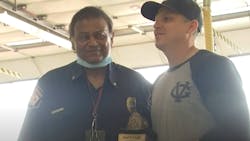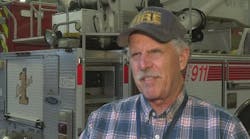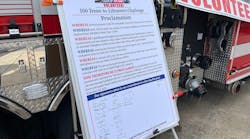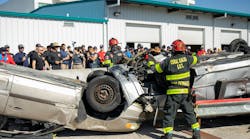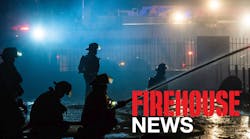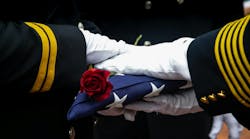When Lawrence Wickliffe was going through his entrance interview for his job with Las Vegas Fire & Rescue, the chief at the time asked the young firefighter to envision his future in the fire service.
Wickliffe's response: to be chief.
"And I actually believed that, that I could achieve that position," Wickliffe told Firehouse.com in a recent interview.
Normally, that's the kind of candor and clarity about career goals most supervisors would want from a new hire. But in the early 1970s, that directness meant he was "too motivated" as an African American in the department, which Wickliffe said was a microcosm for the country at the time.
Wickliffe, 70, retired in April after nearly a half century with the department, finishing as a battalion chief and the distinction of being the state's longest tenured firefighter. Given the longevity of his career, which began in 1974, it's hard to imagine that being a firefighter wasn't always in the cards.
Many firefighters enter the fire service out of a desire that starts early on as a child or because it's passed down as part of the "family business" between generations. That wasn't the case for Wickliffe, who hadn't thought about becoming a firefighter until his brother-in-law brought it up to him.
At the time, Wickliffe was graduating from the College of Idaho with a double-major in sociology and psychology. He had thought about pursuing a job in one of those fields before his brother-in-law, who was a firefighter, made his pitch.
"I kind of thought of it as an insult," Wickliffe said. "If I was getting a formal education, why would I go get a job that requires a high school diploma? … But in those days, the fire department paid $2,000, $3,000, $4,000 more a year than the other areas that required degrees. So it was a logical choice to try to pursue that."
Firefighting beat out the social sciences, and Wickliffe was hired by Las Vegas Fire & Rescue, earning top marks at the academy. Despite his high achievement early on, Wickliffe quickly discovered a glass ceiling for African Americans, even though they were being recruited to the fire service out of college.
"They had not seen us in a leadership position and not seen us in charge, so it was easy to draw the conclusion that we couldn't do the job," he said.
One of the ways Wickliffe was able to earn the respect of his white colleagues was by drawing on his time at the College of Idaho, where he had played on the school's football team. At the time, the department played in an annual football game against the police department.
"As a result of that football game, it gave people a chance to evaluate African-Americans on their abilities to do things and their education and their physical attributes," he said. "And if you've ever been on any team, the teams are more united than the communities, and as a result, people got to know you in a different way."
Shortly after joining the department as a firefighter, Wickliffe shifted his focus to becoming a paramedic, a position that he held for 14 years. One of his earliest calls as a paramedic also was the first major incident he responded to in his career. The historic fire on Nov. 21, 1980, at the MGM Grand Hotel and Casino on the Strip killed 85 people and remains the worst disaster in Nevada history.
"All we had to do was basically get an IV started on them, get them to the hospital and whatever medication they needed, they were already prepped and ready to be treated," said Wickliffe, adding that the fire, as well as a fire a few months later at the Las Vegas Hilton, is responsible for changing safety guidelines and fire codes around the world.
Working in the fire service means the odds are probably great that a career will begin and end with a tragedy. Wickliffe was operations chief when Stephen Paddock opened fire on an outdoor music festival from the Mandalay Bay Hotel in 2017, killing 60 and wounding hundreds more.
"I hadn't had that type of situation before," he said. "I've had fires at the top of a building, people jumping out of a building ... but not somebody shooting at you while you're trying to help people. That was a unique experience. I wouldn't wish that on nobody because when I look back on that, if he had made up his mind to target me, I would've been maybe a goner. You might say, I got kinda lucky."
In 1993, Wickliffe earned the rank of battalion chief, and he held that post until last month's retirement. Over the years, he has pursued fire chief openings like the kind his younger self had sights set on early in his career. But as he built a family along with a career, he became more focused on stability over status, and he doesn't regret choosing that path.
"I don't feel bad," Wickliffe said about his career. "I didn't leave anything on the table. I tried to help. I tried to be supportive. I didn't bite my tongue. ... I cared about everybody as best I could. And so I don't look back and say, I wish I would've done this or I wish I would've done that because for the most part, it was all part of being human."
